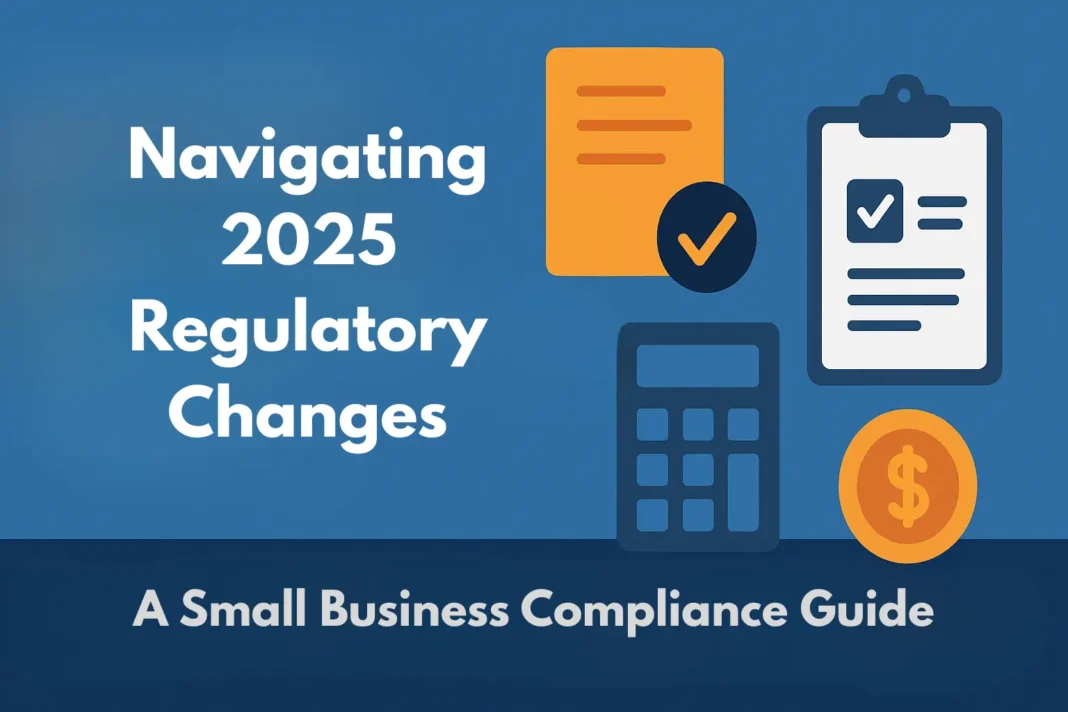Introduction

Running a small business in 2025 feels like navigating a maze — every turn brings new tax rules, digital regulations, and reporting requirements. Staying compliant isn’t just a legal necessity anymore; it’s a survival skill. For small businesses, these changes can feel overwhelming, but understanding them can actually help you grow smarter and operate more efficiently.
Understanding Regulatory Changes in 2025
Governments worldwide have tightened their rules around data privacy, labor laws, and sustainability. In countries like the U.S., U.K., and India, small business tax compliance systems have gone digital — making real-time reporting and e-invoicing mandatory for certain sectors.
These changes aim to increase transparency and close tax gaps, but they also add new layers of responsibility for entrepreneurs.
Key Tax Law Updates for Small Businesses
Tax laws are evolving fast. In 2025, several governments introduced lower corporate tax rates for microenterprises while raising documentation requirements for deductions.
For example:
-
Digital Tax Reporting: Many countries now require digital filing systems connected directly to revenue authorities.
-
E-Commerce Taxation: Online sellers are being taxed where their customers are located, not where their businesses are registered.
-
Small Business Deductions: New credits and incentives are available for digital transformation and green energy adoption.
Labor and Employment Regulation Updates
The workforce has changed dramatically post-pandemic. With hybrid and remote work models becoming permanent, governments updated labor rules to reflect flexibility and fair compensation.
Key changes include:
-
Updated minimum wages in multiple regions.
-
Clearer rules on contractor vs. employee classification.
-
Enhanced workplace safety laws, especially for industries like manufacturing and delivery.
Staying compliant means updating contracts, payroll systems, and workplace policies.
Data Privacy and Cybersecurity Requirements
If your business handles customer data, you’re now held to stricter standards. New laws similar to the EU’s GDPR are being adopted globally — requiring consent-based data collection, encrypted storage, and prompt breach reporting.
Ignoring these laws can result in heavy fines and loss of consumer trust. Consider implementing strong firewalls, regular audits, and employee training to stay ahead.
Environmental and Sustainability Regulations
Eco-friendly business isn’t just a trend — it’s becoming a requirement. Many small businesses now need to report their environmental impact or carbon footprint.
However, the good news is that tax breaks and government grants are available for green initiatives like energy-efficient machinery, waste reduction, and sustainable packaging.
Licensing and Permitting Requirements
Each year, thousands of small businesses face penalties because of expired licenses or missing permits. In 2025, many licensing systems have moved online, simplifying renewals but requiring digital record-keeping. Always maintain a checklist of your business permits and renewal dates to avoid disruptions.
Navigating Industry-Specific Regulations
Every sector comes with its own compliance hurdles.
-
Healthcare: Tightened patient data protection.
-
Finance: Stricter anti-money laundering (AML) measures.
-
Tech: AI transparency and algorithm accountability.
Knowing your industry’s unique requirements ensures you stay legally protected and competitive.
The Role of Digital Transformation in Compliance
Automation is no longer optional — it’s your compliance partner. Tools like QuickBooks, Xero, and TaxDome help track expenses, generate reports, and file taxes automatically. AI-based monitoring can even alert you when new regulations affect your business operations.
Common Compliance Mistakes Small Businesses Make
-
Ignoring minor law updates.
-
Mixing personal and business finances.
-
Failing to maintain digital records.
-
Relying on outdated tax software.
These mistakes can cost your business dearly. A simple internal audit once a quarter can prevent most compliance issues.
Steps to Build a Strong Compliance Framework
-
Create a compliance calendar — track all tax, labor, and license deadlines.
-
Assign a compliance officer (even part-time).
-
Conduct regular training for staff on new laws.
-
Use cloud storage for secure record-keeping.
These steps reduce risks and demonstrate credibility to banks and partners.
Working with Legal and Financial Advisors
Many small business owners hesitate to hire advisors, thinking they’re too expensive. But today, many online legal and tax services offer affordable subscription plans for compliance management. Having a trusted expert can save you from fines worth thousands.
Government Support and Incentives
Governments encourage compliance through tax credits, grants, and training programs. Check your local small business administration website or government portal for official updates. You might qualify for financial incentives just for maintaining proper compliance records.
How to Stay Updated with Future Regulatory Changes
Don’t wait until the last minute. Subscribe to:
-
Government newsletters
-
Reputable business media (Forbes, Inc., Entrepreneur)
-
Compliance tracking apps
These will alert you to changes before they affect your business.
Conclusion
Regulatory changes may seem intimidating, but with the right mindset and tools, they can become opportunities for growth. Staying compliant builds trust, attracts investors, and positions your business for long-term success. In short — compliance isn’t a burden; it’s your business’s safety net.
FAQs
1. How often do small business laws change?
Typically, tax and labor laws are updated annually, but data privacy and environmental rules may change more frequently.
2. What’s the easiest way to stay compliant?
Use digital compliance software and subscribe to official updates from your government or local tax authority.
3. Are there penalties for late tax filings?
Yes, penalties may include fines, interest charges, and suspension of business licenses.
4. Can I manage compliance on my own?
Yes, small businesses can handle it independently with the right tools and checklists, but periodic expert review is recommended.
5. What’s the biggest mistake small businesses make with regulations?
Ignoring small updates or assuming they don’t apply to their business — that’s how most compliance problems begin.







